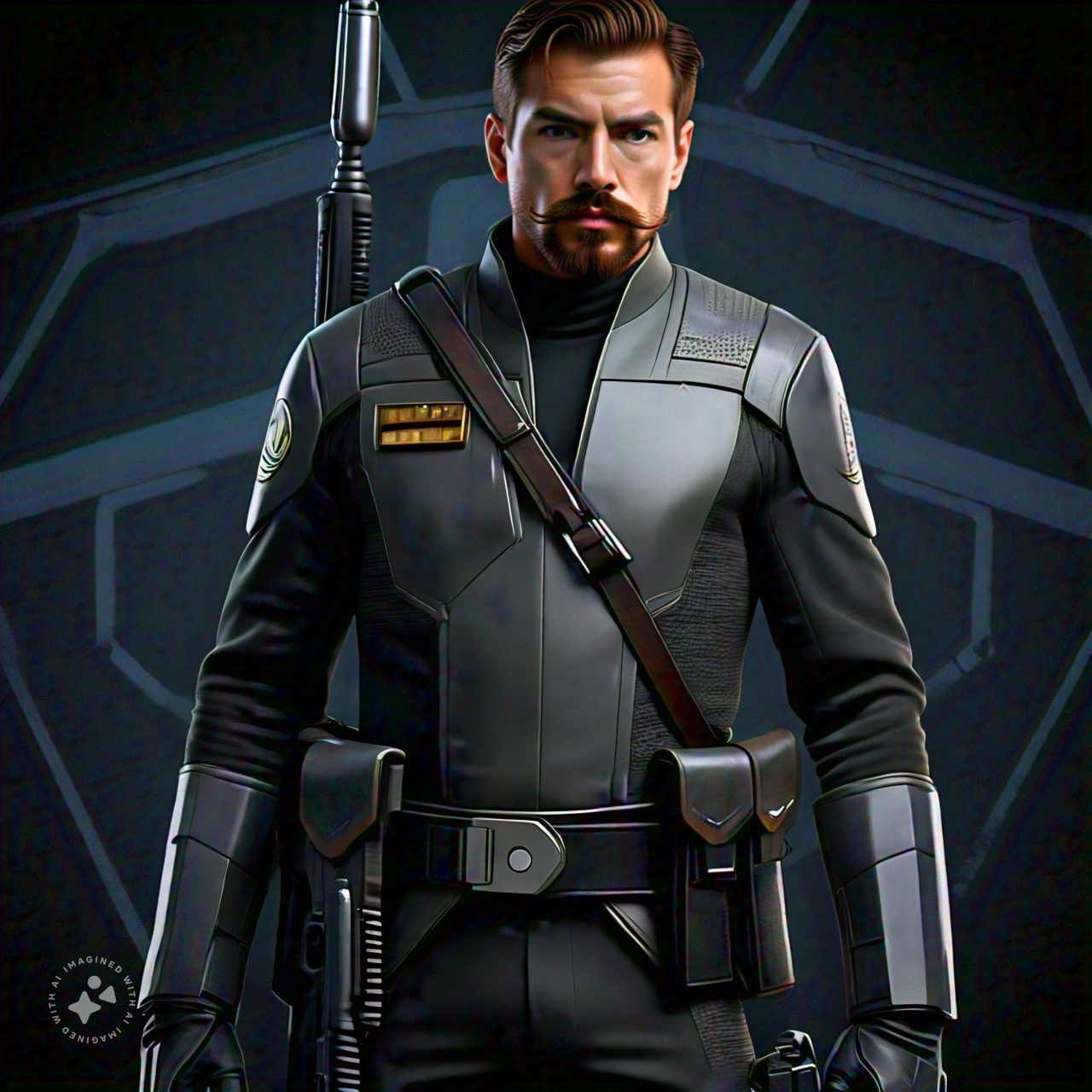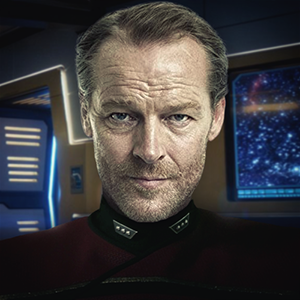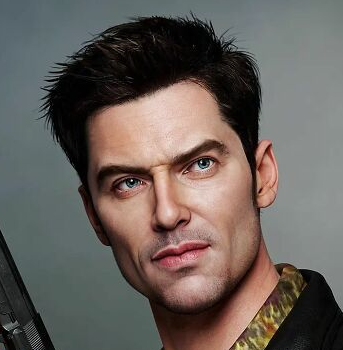Ensign Sark’s Medical Log, Stardate 79251.5,
Our field trip to the mining colony of Orbath’s Hold has proved… instructional if little else. We vaccinated the better part of the population from Cartalian fever but discovered a community already suffering from an outbreak. Whenever it looks like the Deneb Sector will be free of that virus, we dig up another pocket somewhere else. The USS Edmund Hillary is ferrying the most critical cases back to Caelum Station for treatment.
While the rest of his training squad chased Doctor Weld around sickbay like a pack of affection-starved puppies, Sark trailed behind by a few languid steps. The oversized sickbay module aboard their Challenger-class cruiser was plushly carpeted like the Galaxy-class of old. Given how spaciously the biobeds were spread out, it meant a whole lot more steps to keep up with them.
Intellectually, Sark trusted the process. He understood it was his responsibility –his duty as a medical student– to observe Weld’s techniques and learn from them. It would work. But, in his chest, watching felt hollow by comparison. He gripped the empty hypospray in his hand, holding tight. Not being allowed to practice medicine yet felt voyeuristic, when he had just been vaccinating patients — even if it was entirely under medical supervision.
Trudging to Tress’s side, Sark envied her rapt attention. She was clearly taking some cerebral joy from studying Weld’s attempt to treat the patient’s shallow breathing. And so, he felt some slight shame in poking her shoulder with the blunt end of the hypospray. Without looking at him, Tress brushed at her shoulder absently.
Because his shame was oh so very slight, Sark only waited another moment before tapping at her shoulder again. He kept his hand tucked into the sleeve of his uniform with only the hypospray poking out. When Tress glanced at the hypospray on her shoulder, she jolted and then rolled her eyes.
“Did it help?” Sark asked her in an excited whisper. “Injecting so many patients? Like exposure therapy?”
From where he stood on the other side of Tress, Nnekin slouched to ask her, “What’s he complaining about now?”
Although Nnekin ostensibly lowered his voice, his deep rumble still reached Sark. Touched him. Sark leaned back slightly, using Tress’s body as a wall behind which he could share her secret with Nnekin.
“She didn’t tell you?” Sark asked, raising his eyebrows in exaggerated surprise.
Huffing, Tress told Nnekin, “I was scared of hyposprays as a child. Not now. Back then.”
Snickering, Sark volleyed, “What possessed you to become a doctor if hyposprays scare you?”
Staring into the middle distance, Tress licked her lips. She breathed in through her nose.
Looking at Nnekin, Tress said, “I am a practicing science officer in medical training,” and then she looked at Sark to say, “I haven’t decided what I’m going to be.”
Her statement hung in the air between them, and was punctured by the shrill scream of a patient’s vital signs flatlining. The biofunction monitor over the bed squealed, while flashing red warning lights.
Instinctively, Doctor Weld reached a hand for the patient’s chest, but the quarantine field stopped him. Without a modern surgical suite available aboard the Edmund Hillary, the airborne nature of Cartalian fever meant all of the treatment had to be administered via the biobed to protect the medical staff from infection.
Despite his understanding of this, Sark was still surprised when Doctor Weld ordered him, “Sark, get under the bed.”
“What did I do?” Sark asked defensively.
“He’s still breathing,” Weld said. “It’s the biobed’s diagnostic systems that stopped functioning. I can’t spare a nurse and you’re not doing anything.”
Given the opportunity to leap into action, Sark pushed past his fellow med students, and he threw himself to the deck, shoulder first. He rolled under the biobed and flipped open his tricorder to see what might be wrong. Sark tabbed at the screen to switch it to engineering mode and before he could even start the diagnostic, Weld was asking him what was wrong, what was Sark seeing, what was Sark doing.
In all of Sark’s protests to give him a chance to examine the diagnostics, he found his eyes wouldn’t focus on any one flash or blip on his tricorder’s display. He had only started to tap through menu options being presented by his tricorder, when Nnekin lay down beside him and shuffled in under the biobed too. With so little space beneath the bed, Nnekin squeezed in close enough their shoulders and thighs touched. Nnekin was so much taller than him, but he contorted into the small space with such ease.
Nnekin looked at him and Sark could feel the heat of his breath on his cheek.
“Pull those two isolinear chips from the diagnostic subprocessor,” Nnekin said, and he pointed them out.
“Which ones?” Sark asked, distracted by the body heat of Nnekin’s thigh laying on his thigh.
“C’mon, do it,” Nnekin said through a smirk, as if Sark had just been teasing him. He tapped instructions on his own tricorder and he said, “I’ve got big hands. I kept fumbling with the dosage settings on my hypospray on Orbath’s Hold.”
Entranced by the tremor in Nnekin’s voice, Sark obediently yanked out those two isolinear chips from the undercarriage of the biobed.
“I’ve been too busy taking immunology classes to worry about sickbay maintenance, but computers speak to you, huh?” Sark said, nakedly awed at Nnekin’s proficiency.
“I’m not focused, like you. I majored in systems science at the academy and then I swaned off to here,” Nnekin said diffidently. He cracked open the back casing of his tricorder and he ripped out two isolinear chips.
“I’ve reformatted these,” Nnekin said as he tossed them onto Sark’s chest.
Sark reached up to slot them into the biobed. He managed to slide one in. As he reached for the other, the figurative world started to spin. Sark tumbled over his shoulder and he reached for the side of the biobed to steady himself, but his hand grabbed nothing but air. Nnekin’s arms wrapped around his chest and he pinned Sark to the deck with his pelvis.
A dissonant, stomach-churning shudder lurched through the ship. Sark could hear equipment clattering across the deck. The distant background noise of the warp core faltered, stuttered and died.
Time slowed down for Sark as Nnekin kept him from harm’s way. He heard shouts and yelps across Sickbay. Qelreth fell to the deck on her hands and knees, right where Sark would have tumbled if not for Nnekin.
Clearly, they were about to die. Clearly, the ship was failing, or had already failed. Sark’s fingers twitched against the stray isolinear chip. His breathing came fast, uneven. If this was it, if they were going to die…?
Sark kissed Nnekin. And Nnekin grabbed him back the back of the head and held him closer. They kissed until the ship stopped spinning. The vibrations in the deck stopped. All stop. The Edmund Hillary was dead in the water.
Befuddled by what had just happened –to the ship and between them– they clattered to their feet, rising on opposite sides of the biobed.
“What the hell was that?” Tress asked, wincing in visible pain and rubbing her elbow.
Sark knew he should ask if she was okay, or if she had fallen, or if a bone was broken. But he couldn’t speak just yet. He felt his face flush hot. Mentally, he debated if Tress was talking about the drop out of warp or the long moments of Sark getting handsy with Nnekin.
Sark decided for her.
“Engineers went on strike?” he said, still slightly out of breath.
“–captain thinks we hit a subspace Blackout zone, like Starfleet have noticed popping up all over the quadrant,” reported Doctor Weld, marching ahead of Sark and his training squad at an uncomfortably brisk pace.
“There were no reports of blackouts en route to Caelum Station when we left Orbath’s Hold. Still, long-range communications have gone silent and our warp field collapsed. The warp engines keep stalling, like subspace isn’t even there. We don’t understand why this is happening, or the limits of the effect, but we have to keep moving.”
Tress raised her hand, even though she was scurrying behind Weld to keep up with him.
She asked, “Commander, has the engineering team attempted a frequency offset to distort the warp field asymmetry–”
“Please don’t interrupt me when I’m giving orders,” Weld said. Although it came out stridently, he looked back over his shoulder and tittered half a laugh. Smirkingly, he added, “I’ll forget what I’m saying.”
The heavy double doors heaved open as Weld approached, giving them access to the massive shuttlebay. Two wide-set Type 7 shuttlecraft were being prepared for launch, including patients being loaded into the aft areas by nurses.
Weld affirmed, “Our patients need a hospital, not a sickbay. So you’re going to scout the limits of this blackout cell. For all we know, we’re still on the very edge of the phenomenon. As soon as you connect to Starfleet’s subspace communication network, drop a signal buoy transmitting your coordinates. But don’t wait for the other shuttle or the Hillary. Set course for Caelum Station at maximum warp and get your patients into the emergency room.”
“But sir,” Tress said, without raising her hand this time, “What happens if one of our patients goes into respiratory arrest? If each shuttle has two patients and two biobeds, there’s no space for a stasis unit.”
Weld looked at Tress. Looked at her hard. His crystal green eyes always looked like a portal to vastness, but in that question, there was only an empty stare behind his eyes. His face was unreadable.
“You’re first-year medical students,” Weld said. “Under no circumstances do you lower the quarantine field between the cockpit and the aft compartment.”
He paused. He exhaled sharply from his nose.
“If your patient goes into respiratory arrest, they won’t make it.”

 Bravo Fleet
Bravo Fleet












